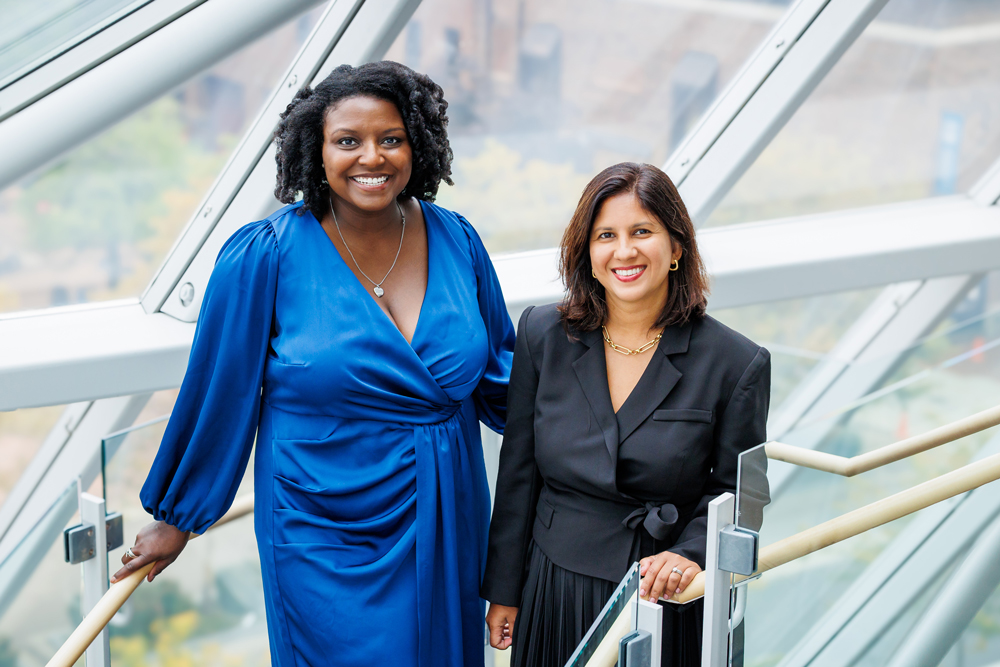By Christianna McCausland

When Prof. Shanta Trivedi became faculty director of the Sayra and Neil Meyerhoff Center for Family, Children and the Courts (CFCC) in 2021, she knew she was building on an incredible foundation laid by the center’s founding director, Professor Emerita Barbara Babb. Rather than find the opportunity daunting, she and executive director Aubrey Edwards-Luce, who joined in 2023, have made CFCC very much their own.
Trivedi explains that for its first 20 years, CFCC’s focus was on creating an environment where people could experience the law with more dignity. “But no matter how kind the legal actors and the legal system seem to be, there’s always some kind of trauma,” she says. “Our shift has been to focus more on preventing people from interacting with legal systems unnecessarily—particularly those systems that have severe consequences for families, including family separation.” Legal systems separate families through foster care, incarceration of adults, and detention or commitment of youth, Trivedi says.
She explains that going forward, CFCC’s work is focused on three key areas: disrupting the school-to-prison pipeline, reducing the harms of the child welfare/family regulation system, and the youth legal system. These are systems Trivedi and Edwards-Luce know well. Trivedi, who is an assistant professor of law, previously represented parents in family regulation cases. Edwards-Luce, who was a social worker prior to becoming an attorney, represented children in those proceedings.
Today, CFCC is evolving its signature program, the Tackling Chronic Absenteeism Program (TCAP). Begun in 2005, TCAP – then known as the Truancy Court Project — engages students, parents, schools and the legal system to tackle the underlying issues of chronic absenteeism before it can lead to truancy court and harmful interaction with the law. Edwards-Luce explains that CFCC made a data-informed decision to shift its work exclusively to middle schoolers, and to work intensively and intentionally in three schools. “We’re also strengthening our relationship with the Maryland Office of the Public Defender,” she says. “We’re starting the process of taking referrals of young people who have been in youth jails and are now released back to the community who are trying to get connected to school and are in need of some educational supports.”
Trivedi is a passionate legal scholar and policy advocate in the CFCC’s focus area of family regulation. Her writings on the topic have appeared in prestigious law reviews and in media outlets including Ms. Magazine and Slate. She explains that too often, a child is removed from a household for reasons that have more to do with poverty and discrimination than safety. Removals lead to extreme and often irreparable trauma for both children and their parents.
“There are estimates that a third of the children in foster care could be reunited with their families if they had secure housing, for example,” says Trivedi. “There are systemic causes that lead parents to be in precarious financial situations that could, certainly, be harmful to their children. But the response, rather than to provide the families with support, is to separate those families and, ironically, pay foster parents to care for those children instead of giving the money to families who need the financial support.”
In addition to writing and advocating around the harm of family removal, CFCC recently conducted a training with approximately 100 Baltimore City School psychologists to help them interrogate the standard of reporting for abuse and neglect to Child Protective Services, and explore alternatives to reporting, such as connecting families with community resources like a food pantry. Through its newest project, the Child Welfare and Racial Equity Collaborative (CWARE), which Edwards-Luce launched in 2020, CFCC also published a free Know Your Rights Toolkit to educate families on how to navigate the family regulation system, and it conducted a nationwide webinar on the toolkit.
CFCC wants to ensure that its work is informed by the lived experience of those who understand it best—those who have been in foster care, for example, or parents who have experienced child separation—rather than only by well-intentioned attorneys. Coalition building has been an important expansion area for the center’s leadership. CFCC has worked with families and like-minded organizations to establish Maryland Families Together, a community of advocates who center the innovation and expertise of directly impacted people and communities. CFCC is also part of the Maryland Youth Justice Coalition and the state’s Coalition to Reform School Discipline, among many others.
CFCC is deepening its commitment to service and advocacy. Edwards-Luce serves on Gov. Wes Moore’s Commission on Juvenile Justice Reform and Emerging Best Practices and has been appointed by the American Bar Association’s president to serve on its Commission on Youth and Family Justice. Both women are part of the Maryland Youth Justice Coalition and the state’s Coalition to Reform School Discipline, among others.
Trivedi is a board member for the Maryland Child Alliance and the Redlich Horowitz Foundation. She also provides training and resources on family regulation and family law issues to community organizations, advocates and members of the judiciary, both in Maryland and nationwide. Last year, CFCC submitted written or oral testimony on over 20 bills related to its areas of focus and hopes to increase that advocacy and grow student involvement in this work in future.
Much of what Trivedi and Edwards-Luce want to do is change the narrative around how families and individuals experiencing these legal systems are perceived, away from the negative portrayals common in media to the reality: people facing challenges that drag them into court proceedings are generally doing their very best in difficult circumstances. In so doing, CFCC hopes to keep youth and families away from harmful and often unnecessary legal proceedings so they can be productive parents, caregivers, students and community members and fufill their greatest potential.
Christianna McCausland is a writer based in Baltimore.
